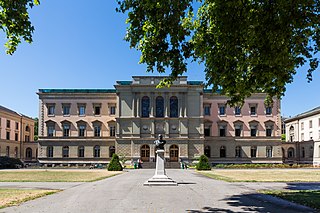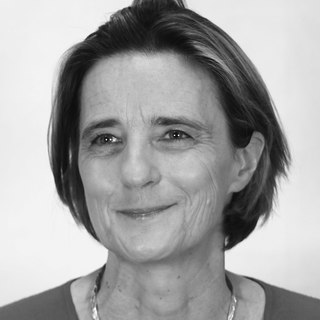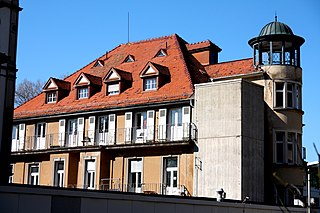
The École Polytechnique Fédérale de Lausanne is a public research university in Lausanne, Switzerland. Founded in 1969 with the mission to "train talented engineers in Switzerland", it is inspired by the École Centrale Paris.
Emulate, Inc. (Emulate) is a biotechnology company that commercialized Organs-on-Chips technology—a human cell-based technology that recreates organ-level function to model organs in healthy and diseased states. The technology has applications in pharmaceutical research, product development, testing how different medicines, chemicals, and foods affect human health. Emulate has also worked with Cedars-Sinai Medical Center on a precision medicine initiative that uses Organs-on-Chips technology in the clinical setting. This initiative is designed to provide clinicians with better data about how an individual patient may respond to treatment. The company also signed a Cooperative Research and Development Agreement (CRADA) with the U.S. Food and Drug Administration to advance and qualify its Human Emulation System to meet regulatory evaluation for product testing.

The University of Geneva is a public research university located in Geneva, Switzerland. It was founded in 1559 by French theologian John Calvin as a theological seminary. It remained focused on theology until the 17th century, when it became a center for enlightenment scholarship. Today, it is the third largest university in Switzerland by number of students.

Ernesto Silvio Maurizio Bertarelli is an Italian-born Swiss billionaire businessman and philanthropist.

Bionics or biologically inspired engineering is the application of biological methods and systems found in nature to the study and design of engineering systems and modern technology.
Neurotechnology encompasses any method or electronic device which interfaces with the nervous system to monitor or modulate neural activity.

Patrick Aebischer was the president of the École polytechnique fédérale de Lausanne (EPFL) from 17 March 2000 to 31 December 2016. He is a professor in neuroscience and head of the Neurodegenerative Disease Laboratory at the EPFL.

George McDonald Church is an American geneticist, molecular engineer, chemist, serial entrepreneur, and pioneer in personal genomics and synthetic biology. He is the Robert Winthrop Professor of Genetics at Harvard Medical School, Professor of Health Sciences and Technology at Harvard University and Massachusetts Institute of Technology, and a founding member of the Wyss Institute for Biologically Inspired Engineering at Harvard University.

Science and technology in Switzerland play an important role in the Swiss economy, which has very few natural resources that are available in the country. The Swiss National Science Foundation, mandated by the Federal government, is the most important institute for promoting scientific research.

The California Institute for Quantitative Biosciences (QB3) is a nonprofit research and technology commercialization institute affiliated with three University of California campuses in the San Francisco Bay Area: Berkeley, San Francisco, and Santa Cruz. QB3's domain is the quantitative biosciences: areas of biology in which advances are chiefly made by scientists applying techniques from physics, chemistry, engineering, and computer science.

Johann Georg "Hansjörg" Wyss is a Swiss billionaire businessman and donor to politically liberal and environmental causes in the United States. He is the founder and former president and chairman of Synthes, a medical device manufacturer. His Wyss Foundation has more than $2 billion in assets.

Donald E. Ingber is an American cell biologist and bioengineer. He is the founding director of the Wyss Institute for Biologically Inspired Engineering at Harvard University, the Judah Folkman Professor of Vascular Biology at Harvard Medical School and Boston Children's Hospital, and Professor of Bioengineering at the Harvard John A. Paulson School of Engineering and Applied Sciences. He is also a member of the American Institute for Medical and Biological Engineering, the National Academy of Engineering, the National Academy of Medicine, the National Academy of Inventors, and the American Academy of Arts and Sciences.

The Center for Neurotechnology (CNT) is an Engineering Research Center funded by the National Science Foundation, develops devices to restore the body's capabilities for sensation and movement. The center is based at the University of Washington. Its core partner organizations are the Massachusetts Institute of Technology and San Diego State University.

The Lausanne campus or Dorigny university campus is a large area in Switzerland where the University of Lausanne (UNIL), the École polytechnique fédérale de Lausanne (EPFL) and several other institutions are located. It is in Dorigny, towards the west of Lausanne, on the shores of Lake Geneva. The site is about 2.2 kilometres wide and 31,000 people study and work there.

The Campus Biotech is a Swiss institution hosting research institutes and biotechnology companies. The Campus Biotech is located in the former Merck Serono building, in Geneva (Switzerland).
The Health Valley covers the Western Switzerland region, where the life sciences sector extends from Geneva to Bern, including the seven cantons of Bern, Fribourg, Geneva, Jura, Neuchâtel, Valais and Vaud. This cluster presents a critical mass of 1,000 companies, research centers and innovation support structures, representing today more than 25,000 employees. The Health Valley strives to animate the life sciences ecosystem of the region, by establishing thriving bridges between its ambassadors.

Daphné Bavelier is a French cognitive neuroscientist specialized in brain plasticity and learning. She is full Professor at the University of Geneva in the Faculty of Psychology and Educational Sciences. She heads the Brain and Learning lab at Campus Biotech in Geneva, Switzerland.

John Philip Donoghue is an American neuroscientist; he is currently the Henry Merritt Wriston Professor of Neuroscience and Professor of Engineering at Brown University, where he has taught since 1984.

The Bernstein Center Freiburg (BCF) is the central facility for experimental and theoretical research in the areas of computational neuroscience and neurotechnology at the University of Freiburg. As a member of the national network for computational neuroscience (NNCN), founded by the Federal Ministry of Education and Research (BMBF) in 2004, the BCF is one of a total of six Bernstein Centers in Germany. Like the other Bernstein Centers, it was named after the German physiologist Julius Bernstein. The BCF is located in the former Institute of Brain Research ("Neurophys") in Freiburg-Herdern. Initially known as Bernstein Center for Computational Neuroscience Freiburg (BCCN), the institute was renamed Bernstein Center Freiburg in 2010. The coordination site for the national Bernstein Network resides in the building of the Bernstein Center Freiburg.
The Wyss Institute for Biologically Inspired Engineering is a cross-disciplinary research institute at Harvard University focused on bridging the gap between academia and industry by drawing inspiration from nature's design principles to solve challenges in health care and the environment. It is focused on the field of biologically inspired engineering to be distinct from bioengineering and biomedical engineering. The institute also has a focus on applications, intellectual property generation, and commercialization.

















